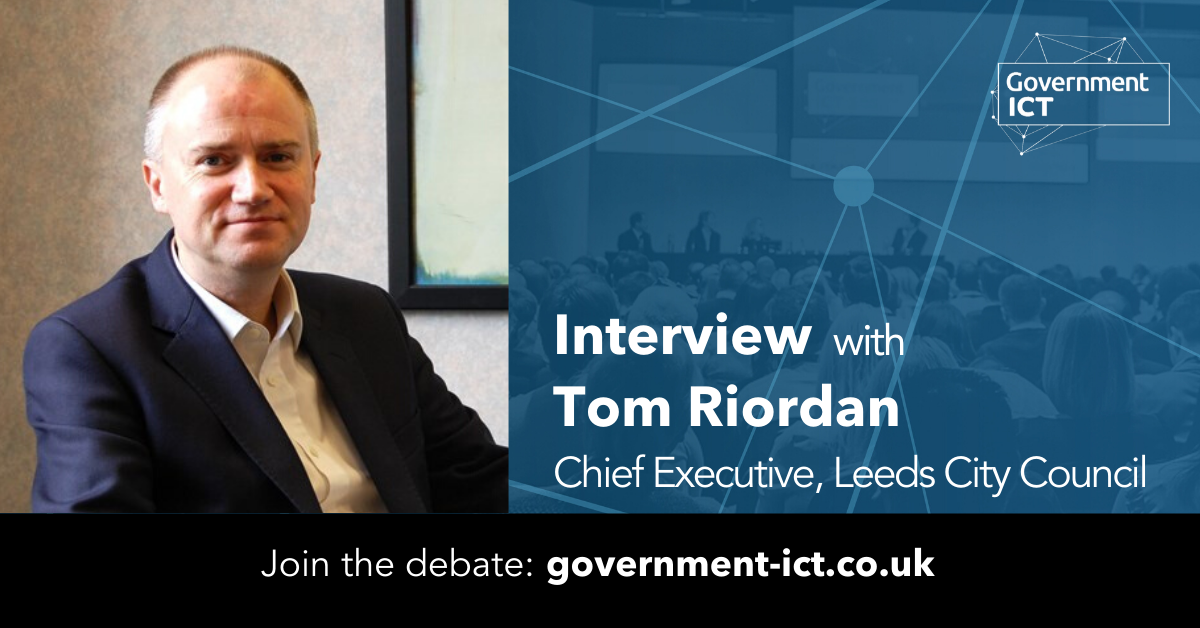Ahead of Government ICT 2020, we spoke to Tom Riordan, Chief Executive of Leeds City Council about how they are using technology to encourage collaboration and operate in a more effective and sustainable way.
Since being appointed Chief Executive in 2010 Tom has overseen £300m of efficiencies across Leeds City Council and a significant transformation of the city, halfway through a £10bn investment pipeline that has delivered Trinity and Victoria Gate shopping centres and the first direct Arena.

We are increasingly recognising how the effective and responsible use of data can play a key role in acting as a vehicle to improve services, to better understand the needs of and to deliver improved outcomes for citizens. In recent years, local government has increasingly been at the centre of this transformative agenda, working with key partners to lead and drive improvements that make a positive difference in people’s lives.
Central to our approach in Leeds, which we are using as a platform, the Council convenes local public service partners, the best of the tech sector and residents to co-produce innovations that deliver better outcomes in terms of community resilience and enhancing the experience of residents. The tech platform that underpins this combines data from different sources and makes it accessible for use by all our partners delivering value to the people of Leeds.
Local examples highlight how local government and effective data use transform the way citizens interact with the council and the delivery of essential services. For example, the Leeds Bins app allows citizens to easily obtain bin collection information; and CareView, a digital tool, enhances outreach teams’ ability to tackle social isolation and loneliness in our communities.
Our Smart Cities approach and re-platforming of the Data Mill is also about capturing data from numerous sensors and operational devices across the city as a whole. Leeds Data Mill (now Data Mill North) is an important example of realising the potential benefits and added value to both the organisation and our communities of open data. It is now being used across a wider geographical footprint, driving to connect skills and creativity right across the region.
Traffic Management, Street Light, Public Safety, Smart Buildings, Energy Efficiency, Parking and Mobility, and Waste data also highlight the potential impact, if combined, to enable cities to operate in a more effective and sustainable way. In these scenarios, it is important that we consider new information governance models and the ethics of using data for different purposes. The council will take on the accountability for governing the data provided by the wider system. Local Governments are best placed to do this as the orchestrators of data across places in future.
This approach is essential to all that we are doing and can only happen if we do it in a joined-up way with people.
Leeds has a strong vision to be the best city for health and wellbeing and to improve the health of the poorest the fastest. Healthcare is an area where we face our greatest challenges and we know we need to make fundamental systems changes which include new models of care like self-care, prevention and using assets across different communities and localities. Realising our ambition to be a global leader for health innovation will also be a key part of achieving our wider vision for Leeds. In a city where we have strong health and care sector we also look to using and sharing information to support our ambitions drawing on the key knowledge base in the city such as the largest concentration of Health and Wellbeing Informaticians in the UK (24%).
Key engagement with stakeholders is also vital which is why Joined Up Leeds was developed for citizens to discuss how their health and wellbeing data could and should be shared, understanding their concerns, and how information could be used for the benefit of people in Leeds. It is a key approach that has now been extended for many other projects and initiatives and a core part of the Yorkshire Wide Care Record Programme.
We are a Population Health Management exemplar for NHS England for the work we are progressing in linking data from right across the continuum of care, where professionals can see whether the level of care that takes a bio-psycho-social approach to personalised problems and concerns. This aligns with the motivation of health professionals, social workers and the third sector: people who start every day with the best of intent and can see how things can be done better if it is made visible to them. This is translating data and insight into action across the whole place.
This is an area where we differentiate in taking a combined whole system approach to data and analytics to inform better evidence-based management and planning for our diverse populations. We bring expertise from across the system including academia (e.g. Leeds Institute for Data Analytics) to work together on these big issues. At the heart of this approach is public trust, which is strengthened by working with people at the centre of the co-producing solutions process through using data.
As the stewards and enablers of the “city as a platform” strategy, the council is successfully utilising our convening power to help us achieve things as diverse as reversing child obesity to attracting Channel 4 to Leeds, ultimately improving the lives of our citizens.
Piers Kelly
Experienced Marketing Manager with a demonstrated history of working in the events services industry. Enjoys writing on Cyber Security, Emerging Tech & Digital Transformation. Marketing professional with a Bachelor of Arts (BA) in Politics and Economics from Newcastle University.


